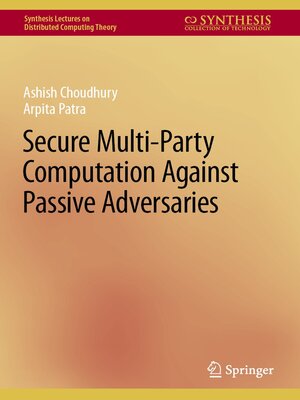Secure Multi-Party Computation Against Passive Adversaries
ebook ∣ Synthesis Lectures on Distributed Computing Theory
By Ashish Choudhury

Sign up to save your library
With an OverDrive account, you can save your favorite libraries for at-a-glance information about availability. Find out more about OverDrive accounts.
Find this title in Libby, the library reading app by OverDrive.



Search for a digital library with this title
Title found at these libraries:
| Library Name | Distance |
|---|---|
| Loading... |
This book focuses on multi-party computation (MPC) protocols in the passive corruption model (also known as the semi-honest or honest-but-curious model). The authors present seminal possibility and feasibility results in this model and includes formal security proofs. Even though the passive corruption model may seem very weak, achieving security against such a benign form of adversary turns out to be non-trivial and demands sophisticated and highly advanced techniques. MPC is a fundamental concept, both in cryptography as well as distributed computing. On a very high level, an MPC protocol allows a set of mutually-distrusting parties with their private inputs to jointly and securely perform any computation on their inputs. Examples of such computation include, but not limited to, privacy-preserving data mining; secure e-auction; private set-intersection; and privacy-preserving machine learning. MPC protocols emulate the role of an imaginary, centralized trusted third party (TTP) that collects the inputs of the parties, performs the desired computation, and publishes the result. Due to its powerful abstraction, the MPC problem has been widely studied over the last four decades.







